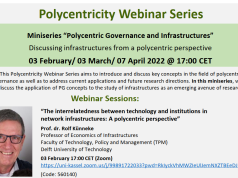Dear members and interested audience,
we are glad to let you know that the webinar series continues!
On April 8th, 5 p.m. (Europe Time)
Dr. Peter Jones ,University College London (UCL) will present his interpretation of coevolutionary governance as a progressive reinterpretation of polycentrism through 28 marine protected area case studies.
As verbaly announced we are changing the modus up an bit, so please find the Zoom-Link and all details as logged-in member of the website here: Webinar_Jones
If you arent member to the network yet, you may sign up here: https://polycentricity.iasc-commons.org/index.php/register/
Abstract
This webinar will discuss a recent analysis of the governance of MPAs through 28 case studies in 15 countries. Limitations of the polycentric governance concept will be discussed, particularly its faith in linkages as a means of resolving conflicts and its assumption that the state should only take a passive role. The concept of coevolutionary governance will be described and justified, noting that this essentially builds on polycentrism’s systematic case study analysis approach, but evolves it to move beyond its limitations. Coevolutionary governance takes a synecology perspective to analyse how incentives coevolve through their functional integration, as well as how social and ecological systems can coevolve through the feedback mechanisms of human impacts and ecological services. Drawing on the wider concept of multi-level governance, coevolutionary governance is considered to provide for synergies between governance approaches, proposing that coordination can be achieved and conflicts addressed through reconfigured roles of the state providing steer through governance in ‘the shadow of hierarchy’. The MPAG empirical framework will be described and the findings of its application outlined. Drawing on these findings, some key trends within and amongst five categories of incentives will be explored. These illustrate that incentives synergistically interact in a way that is analogous to synecology, providing for them to be functionally integrated as a means of combining governance approaches. As such, it will be argued that these findings support the validity of the coevolutionary governance concept, as well as supporting the argument that “diversity is the key to resilience, both of species in ecosystems and incentives in governance systems”.
Biography
 Dr. Peter Jones is a Reader in Environmental Governance at the Department of Geography, University College London (UCL). He is an internationally recognised expert on marine protected area governance issues, having focused on this area of research for 30 years. He recently undertook an applied study for United Nations Environment (UNE) on how to effectively and equitably govern marine protected areas (MPAs), leading to the book Governing Marine Protected Areas: resilience through diversity (Routledge) and the forthcoming UNE policy document Enabling effective and equitable marine protected areas: guidance on combining governance approaches. This ongoing programme of research (www.mpag.info) now includes 50 case studies of MPAs from around the world, applying a novel theoretical and empirical framework that he has developed. Peter originally graduated in Biological Sciences, specialising in marine ecology, but his postgraduate studies and research have since adopted an applied inter-disciplinary approach, blending ecological, legal and social science perspectives to help address real world challenges related to MPAs.
Dr. Peter Jones is a Reader in Environmental Governance at the Department of Geography, University College London (UCL). He is an internationally recognised expert on marine protected area governance issues, having focused on this area of research for 30 years. He recently undertook an applied study for United Nations Environment (UNE) on how to effectively and equitably govern marine protected areas (MPAs), leading to the book Governing Marine Protected Areas: resilience through diversity (Routledge) and the forthcoming UNE policy document Enabling effective and equitable marine protected areas: guidance on combining governance approaches. This ongoing programme of research (www.mpag.info) now includes 50 case studies of MPAs from around the world, applying a novel theoretical and empirical framework that he has developed. Peter originally graduated in Biological Sciences, specialising in marine ecology, but his postgraduate studies and research have since adopted an applied inter-disciplinary approach, blending ecological, legal and social science perspectives to help address real world challenges related to MPAs.













